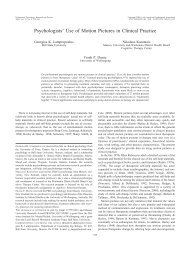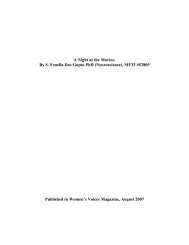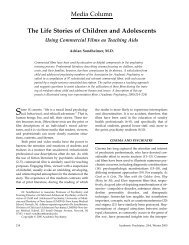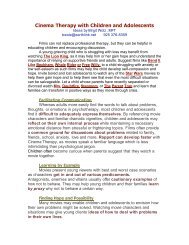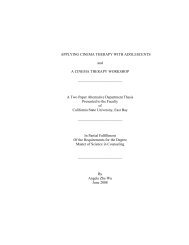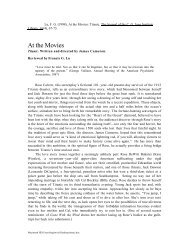Content Analysis of Romantic Comedies IN PRESS ...
Content Analysis of Romantic Comedies IN PRESS ...
Content Analysis of Romantic Comedies IN PRESS ...
Create successful ePaper yourself
Turn your PDF publications into a flip-book with our unique Google optimized e-Paper software.
<strong>Content</strong> <strong>Analysis</strong> <strong>of</strong> <strong>Romantic</strong> <strong>Comedies</strong> 2insight into how they themselves could behave in their own relationships. According toBandura (1986, 1994), individuals commit behaviours they have observed to memory inorder to be later used as models on which to base their own behaviour. Observed behavioursare especially likely to be modelled if they are performed by individuals perceived asattractive and if outcomes are viewed as particularly appealing (Bandura, 1994). That is, if anobserved behaviour results in a desired outcome, adolescents may engage in similarbehaviour believing that in doing so they too will gain the same benefits. However, with themedia typically relying on unrealistic portrayals <strong>of</strong> relationships, it may be that adolescentsmodelling their own behaviour on those seen in the media are unlikely to achieve theobserved desired outcomes.Where social cognitive theory suggests adolescents actively look to the media,cultivation theory suggests the effects <strong>of</strong> media messages may involve a more passiveprocess. According to Gerbner et al (1994), television has become the primary commonsource <strong>of</strong> socialisation and everyday information for a heterogeneous population. Through itsuse <strong>of</strong> repeated themes and images it serves to influence viewer perceptions <strong>of</strong> reality, that is,viewers exposed over a prolonged period <strong>of</strong> time to portrayals <strong>of</strong> reality as defined by themedia may come to develop perceptions that are consistent with these portrayals. Traditionalcultivation theory posits that it is the overall exposure to general media content thatinfluences real world perceptions. However, recent research has suggested that it is notoverall media content but rather genre specific viewing that has a more potent influence onaudiences (e.g. Holmes, 2007; Rössler & Brosius, 2001). Therefore, according to this revisedtheory, viewers exposed to a high level <strong>of</strong> romance media will come to cultivate beliefs andexpectations <strong>of</strong> relationships consistent with those particular presentations over heavyviewers <strong>of</strong> media in general. A major criticism <strong>of</strong> romantic genre television and films is thatthey frequently portray intimate liaisons between physically beautiful characters (Ward &Rivadeneyra, 1999) leading to relationships full <strong>of</strong> romance, physical intimacy, passion



